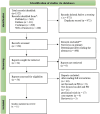The Impact of Diet on Parkinson's Disease: A Systematic Review
- PMID: 39469346
- PMCID: PMC11513219
- DOI: 10.7759/cureus.70337
The Impact of Diet on Parkinson's Disease: A Systematic Review
Abstract
Parkinson's disease (PD) is a progressive neurodegenerative disorder with complex etiology. Emerging evidence suggests that diet may play a role in PD risk, progression, and symptom management. However, the relationship between dietary factors and PD remains poorly understood. This systematic review aimed to synthesize and evaluate the current evidence on the associations between dietary patterns, specific nutrients, and PD risk, progression, and symptom management. We conducted a comprehensive literature search in major databases for studies published up to 2024. Eligible studies included prospective cohorts, case-control studies, randomized controlled trials, and cross-sectional analyses investigating the relationship between diet and PD. Data extraction and quality assessment were performed independently by two reviewers. Eleven studies met the inclusion criteria. Adherence to healthy dietary patterns, particularly those rich in fruits, vegetables, whole grains, and fish, was consistently associated with reduced PD risk. Conversely, Western-style diets high in processed foods and red meat were linked to increased risk. Specific nutrients, including antioxidants and vitamins K and C, showed potential neuroprotective effects, while high iron intake was associated with increased PD risk. Diet quality was found to influence PD symptoms, particularly non-motor symptoms like constipation. Emerging evidence suggested a role for the gut microbiome in mediating diet-PD relationships. Specialized diets, such as ketogenic and low-carbohydrate diets, showed promise in managing PD symptoms in small-scale studies. This review provides evidence for the significant role of diet in PD risk, progression, and symptom management. Dietary interventions have the potential to serve as complementary approaches to existing PD therapies. However, the complex nature of the diet-PD relationship necessitates further research, particularly well-designed long-term randomized controlled trials, to develop evidence-based, personalized dietary recommendations for PD prevention and management.
Keywords: antioxidants; diet; dietary patterns; gut microbiome; neuroprotection; nutrition; parkinson's disease.
Copyright © 2024, Anwar et al.
Conflict of interest statement
Conflicts of interest: In compliance with the ICMJE uniform disclosure form, all authors declare the following: Payment/services info: All authors have declared that no financial support was received from any organization for the submitted work. Financial relationships: All authors have declared that they have no financial relationships at present or within the previous three years with any organizations that might have an interest in the submitted work. Other relationships: All authors have declared that there are no other relationships or activities that could appear to have influenced the submitted work.
Figures
References
-
- Non-motor features of Parkinson disease. Schapira AH, Chaudhuri KR, Jenner P. Nat Rev Neurosci. 2017;18:435–450. - PubMed
-
- Parkinson’s disease. Kalia LV, Lang AE. Lancet. 2015;386:896–912. - PubMed
-
- Neuropathology of autonomic dysfunction in synucleinopathies. Coon EA, Cutsforth-Gregory JK, Benarroch EE. Mov Disord. 2018;33:349–358. - PubMed
Publication types
LinkOut - more resources
Full Text Sources
Miscellaneous

